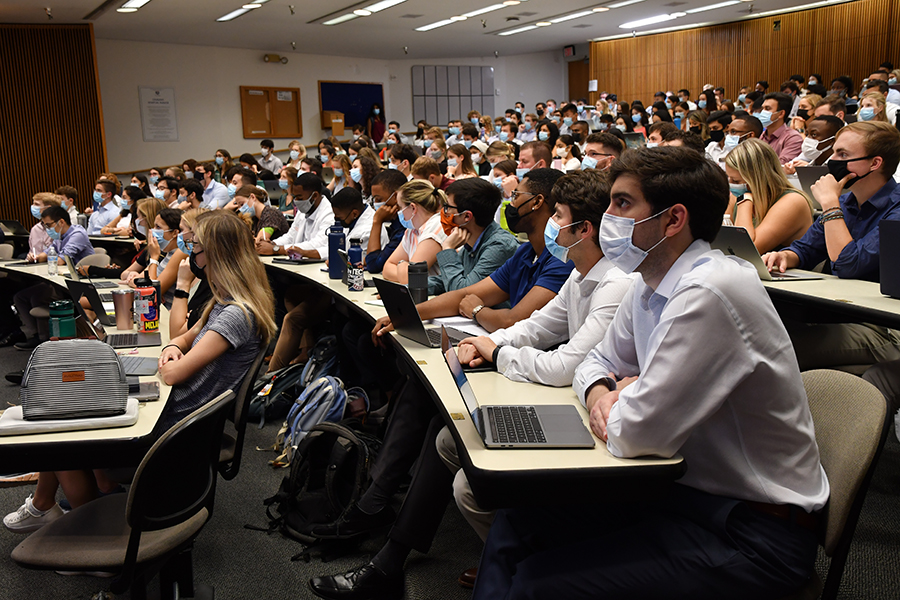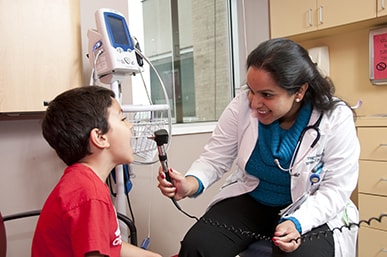专业办公室改善了麦戈文的学习环境

The Office of Professionalism at McGovern Medical School was established in 2020 to form a cohesive and collaborative approach to professionalism that will involve and benefit various constituencies across the school. Led by约翰·里格斯(John Riggs),医学博士, assistant dean for professionalism, the professionalism office has taken its first steps to ensuring a safe learning environment for all students, trainees, and faculty.
“Many educators conceptualize professionalism as an essential part of the educational process, because becoming a physician is really a socialization act,” Riggs said. “It’s something that we learn, more through our interactions with others in a professional, social context, than through books and lectures. It’s that socialization process in this community of practice that changes how we think about ourselves, and how we work collectively for the better good of our patients and society as a whole. Being professional isn’t a fixed trait we are born with or that we graduate medical school having mastered. It is a life-long pursuit.”
2019年,里格斯(Riggs)和医学博士Vineeth John, vice chair for education, were appointed directors of the Clinical Learning Environment. Along withChristine Ford, EdD, education specialist, they heightened the focus on the learning environment at the Medical School following concerns raised by students about how to make the clinical learning environment more welcoming and supportive. In 2020, Riggs was asked to form the Office of Professionalism to ensure that the learning environment at McGovern Medical School is a supportive environment that guides students, trainees, and faculty toward embracing the values and beliefs of our profession.
Their goal is to support work/learning environments at McGovern where students, trainees, and faculty can be inspired and challenged while also comfortably raising questions, concerns, and challenges thereby making the care for patients more effective, and meaningful.
“At the Medical School, long before my appointment, there was already a lot of work being done on professionalism, so we initially set out to curate as much as we could of the existing professionalism education efforts that were going on,” Riggs said. “These efforts weren’t all explicitly recognized as being professionalism education efforts, but upon looking at them, they were closely related.”
Riggs said that reviewing surveys of clinical medical students twice a year shows a tremendous volume of great teaching examples.
“We get pages of accolades from the students about the resident and faculty teaching but also some areas that need improvement,” Riggs said. “We create customized improvement plans with our clerkship directors twice a year based on this student input.
“After the Office of Professionalism opened, we also surveyed residency, fellowship, and clerkship directors and asked them what sort of educational initiatives they had in place already, and what their needs were regarding educational professionalism. One of the common discomforts they felt with creating a professional environment was having high-stakes conversations with trainees, peers, or their supervisors.”
Responses showed that residency, fellowship, and clerkship directors recognized they are essentially responsible for improvements to their learning and working environments but have little training in how to have difficult but necessary conversations.
里格斯说:“我们看到有必要与同龄人,受训者和主管谈论困难情况,以建立信心,安慰和安全感。”
为了解决这些问题,里格斯发现了休斯敦Uthealth提供的一门课程,称为“关键对话”。专业办公室正在适应与高等教育挑战相关的方案,并渴望将其提供给绝大多数文职人员和计划主管。
Speaking with students at McGovern Medical School also revealed additional directions for attention. For example, it is clear that there are some more stressful learning environments where students could learn to thrive.
“When someone joins the medical profession, it is unlikely that they have been exposed to the inevitable stresses of caring for those in need. There will be times during the practice of medicine when things will be stressful,” Riggs said. “We found that those types of learning or work environments tend to be the ones with complex schedules and vocabularies, longer hours, and possibly sleep deprivation, due to the needs of our patients. These are the realities of taking care of patients in some circumstances. So, how can we use that as an opportunity to better prepare our students to thrive in those situations?”
To address this, the Office of Professionalism is working with students and clerkship directors to develop student workshops called Thriving in Stressful Environments.
As a way to ensure growth in expanding the Office of Professionalism’s vision, Riggs, along withSasha Adams, MD, associate professor ofsurgery;Omonele Nwokolo, MD, associate professor ofanesthesiology; andSara Guzman-Reyes, MD,麻醉学副教授;最近完成了12个月Academy for Professionalism in Health CareLeadership Excellence in Educating for Professionalism scholars’ program. The Academy seeks to optimize patient care through professionalism education, scholarship, policy, and practice in all health-related fields.
“The four of us from McGovern along with people from across the country have been participating in this program to get a better understanding of professionalism education and ways to advance that in our institutions while working with internationally recognized leaders in this field,” Riggs said. “It’s given us a tremendous amount of insight into how to expand professionalism education.”
Through their work with the academy, the team developed a research project with perioperative clinical providers to help them reflect on their professionalism behaviors and where they personally want to grow.
To honor the many professionalism education efforts being created across McGovern Medical School, the Office of Professionalism created theFaculty Award for Professionalism Educationfor individuals who have established one or more successful programs promoting professionalism education for learners enrolled in undergraduate or graduate programs. The recipient of the Faculty Award for Professionalism Education will receive a $2,500 reward and will be recognized at an award ceremony where they will provide a brief presentation on their contributions.
尽管仍处于起步阶段,但麦戈文医学院的专业素养办公室已成为改善学生,受训者和教职员工的学习环境的重要组成部分。有关专业办公室办公室的更多信息,请与MD约翰·里格斯(John Riggs)联系John.W.Riggs@uth.tmc.edu, or Vineeth John, MD, atVineeth.P.John@uth.tmc.edu.
